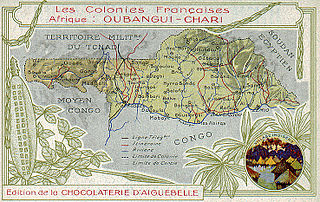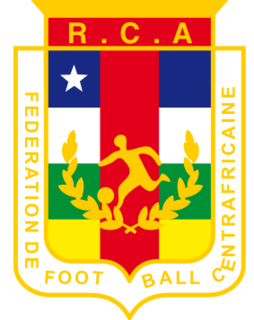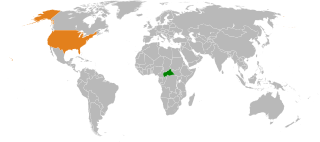
The Central African Republic is a landlocked country in Central Africa. It is bordered by Chad to the north, Sudan to the northeast, South Sudan to the southeast, the DR Congo to the south, the Republic of the Congo to the southwest, and Cameroon to the west.

The history of the Central African Republic is roughly composed of four distinct periods. The earliest period of settlement began around 10,000 years ago when nomadic people first began to settle, farm and fish in the region. The next period began around 1,000 to 3,000 years ago when several non-indigenous groups began to migrate into the region from other parts of the continent. The third period involved the colonial conquest and rule of the country by France and Germany which spanned from the late 1800s until 1960 when the Central African Republic became an independent state. The final period has been the era during which the Central African Republic has been an independent state.

The economy of the Central African Republic is one of the world's least developed, with an estimated annual per capita income of just $805 as measured by purchasing power parity in 2019.

The Central Powers, also known as the Central Empires, was one of the two main coalitions that fought World War I (1914–18). It consisted of German Empire, Austria-Hungary, the Ottoman Empire and Kingdom of Bulgaria and was also known as the Quadruple Alliance. Colonies of these countries also fought on the Central Powers' side such as German New Guinea and German East Africa, until almost all of their colonies were occupied by the Allies.

Bangui is the capital and largest city of the Central African Republic. As of 2020 it had an estimated population of 889,231. It was established as a French outpost in 1889 and named after its location on the northern bank of the Ubangi River ; the Ubangi itself was named from the Bobangi word for the "rapids" located beside the settlement, which marked the end of navigable water north from Brazzaville. The majority of the population of the Central African Republic lives in the western parts of the country, in Bangui and the surrounding area.

From 4 December 1976 to 21 September 1979, the Central African Republic was officially known as the Central African Empire, after military dictator Marshal Jean-Bédel Bokassa declared himself an absolute monarch, and the republic an empire.

A unitary state is a state governed as a single entity in which the central government is the supreme authority. The central government may create administrative divisions. Such units exercise only the powers that the central government chooses to delegate. Although political power may be delegated through devolution to regional or local governments by statute, the central government may abrogate the acts of devolved governments or curtail their powers.

Central Africa is a subregion of the African continent comprising various countries according to different definitions. Angola, Burundi, Cameroon, the Central African Republic, Chad, the Democratic Republic of the Congo, the Republic of the Congo, Equatorial Guinea, Gabon, Rwanda, and São Tomé and Príncipe are members of the Economic Community of Central African States (ECCAS). Six of those states are also members of the Economic and Monetary Community of Central Africa (CEMAC) and share a common currency, the Central African CFA franc.

The Central African Republic national football team, nicknamed Les Fauves, is the national team of the Central African Republic and is controlled by the Central African Football Federation. They are a member of CAF. Despite being traditionally one of the weakest teams in Africa and the world, they recently achieved success. They won the 2009 CEMAC Cup by beating Gabon in the semi-finals and Equatorial Guinea in the final 3–0. Their FIFA ranking rose from 202nd in August 2010 to 89th by July 2011. On 10 October 2010, they earned a shock 2012 Africa Cup of Nations qualifier win at home against Algeria 2–0, which put them top of their qualification group. The team won its first FIFA World Cup qualifier on 2 June 2012 after beating Botswana 2–0 at home.

The National Assembly is the lower house of the Parliament of the Central African Republic. Members are elected in single-member constituencies using the two-round system. Members serve five-year terms.

West Africa Time, or WAT, is a time zone used in west-central Africa. West Africa Time is one hour ahead of Coordinated Universal Time (UTC+01:00), which aligns it with Central European Time (CET) during winter, and Western European Summer Time (WEST) / British Summer Time (BST) during summer.

Central African Republic–United States relations are the international relations between Central African Republic and the United States of America. The relations have generally been positive, although concerns over the pace of political and economic liberalization and human rights have affected the degree of support provided by the United States to the Central African Republic.

The Republic of the Congo, also known as Congo-Brazzaville, the Congo Republic or simply either Congo or the Congo, is a country located in the western coast of Central Africa. The country is bordered to the west by Gabon, to its northwest by Cameroon and its northeast by the Central African Republic, to the southeast by the DR Congo, to its south by the Angolan exclave of Cabinda and to its southwest by the Atlantic Ocean. French is the official language of the Republic of the Congo.

Christianity is the largest religion in Central African Republic, with Catholicism being the largest branch. Islam is practiced by 9 percent of the population. The vast majority of Muslims are Malikite Sunni. It is believed that many of these followers incorporate traditional indigenous elements into their faith practices. According to a 2019 study Protestants outnumber Catholics in the Central African Republic.

Central African cuisine includes the cuisines, cooking traditions, practices, ingredients and foods of the Central African Republic (CAR). Indigenous agriculture in the country includes millet, sorgum, banana, yam, okra, yellow onion, garlic, spinach, rice and palm oil. Imported crops of American origin include maize, manioc (cassava), peanuts, chili peppers, sweet potato and tomato. Additional foods include onions garlic, chiles and peanuts.

The Central African Republic Civil War is an ongoing civil war in the Central African Republic (CAR) involving the government, rebels from the Séléka coalition, and anti-balaka militias.

Visitors to the Central African Republic must obtain a visa from one of the Central African Republic diplomatic missions or French diplomatic missions unless they come from one of the visa exempt countries.
The Military ranks of Central African Republic are the military insignia used by the Central African Armed Forces. Being a Landlocked country, the Central African Republic does not have a navy. The Central African Republic shares a rank structure similar to that of France.














